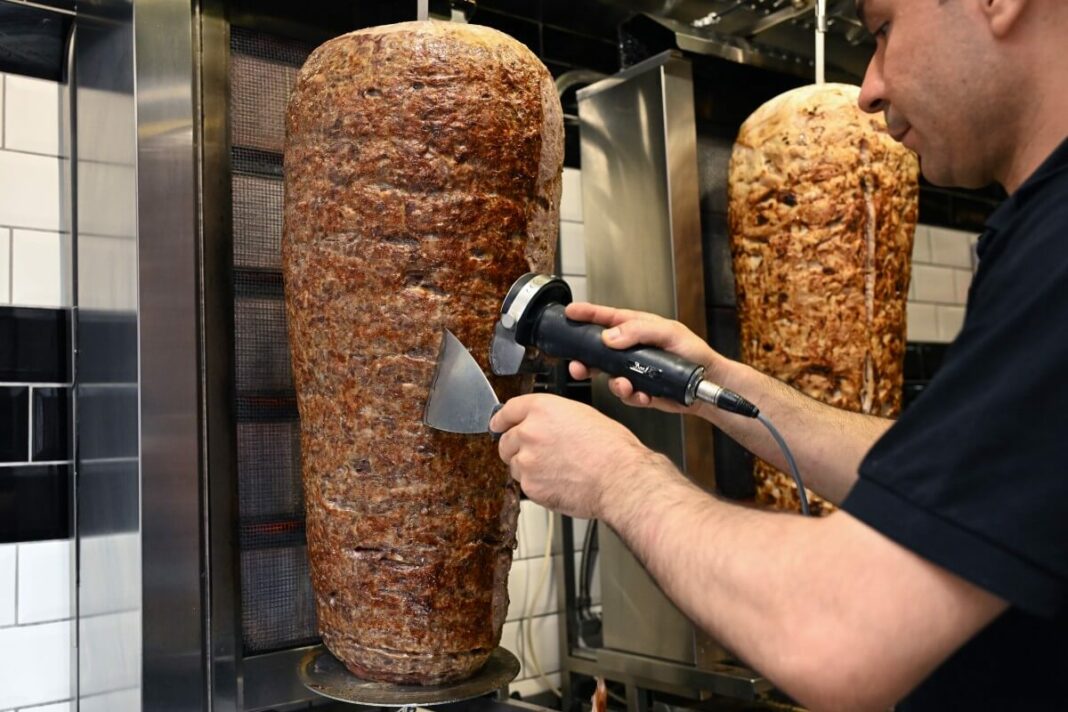A spicy row has erupted between Turkey and Germany over what constitutes a döner kebab, with Berlin objecting to a Turkish push for protected status for the iconic snack.
The humble döner, made with thinly sliced meat cooked on a vertical rotisserie, has its origins in Turkey but is also beloved in Germany after being introduced there by Turkish migrants.
In April the International Döner Federation (Udofed), based in Turkey, filed an application with the European Commission to grant döner kebab Traditional Specialty Guaranteed (TSG) status.
From the exact meat and spices to the thickness of the knife used to slice the meat, Udofed wants the definition of the döner to adhere to a strict list of criteria.
If successful, the application would bar businesses in the European Union from using the name döner kebab unless it met the criteria, giving it the same protected status as Italy’s bufala mozzarella or Spain’s Serrano ham.
In its application, Udofed hails the döner’s origins during the Ottoman Empire, citing a recipe found in manuscripts dating from 1546.
But that has sparked an uproar in Germany, where the döner has become an emblem of the country’s large Turkish community, descended from “guest workers” invited under a massive economic program in the 1960s and ’70s.
The German capital even claims the döner kebab to be “a Berlin invention.”
“It happened in Berlin: Legend has it, Kadir Nurman was the first to put the meat in flatbread in 1972 and invented the version of döner that is so beloved in Germany,” according to the city’s website.
“The döner belongs to Germany. Everyone should be allowed to decide for themselves how it is prepared and eaten here. There is no need for any guidelines from Ankara,” said Agriculture Minister Cem Özdemir, whose parents migrated from Turkey.
Meaty argument
Germany’s agriculture ministry viewed Turkey’s application “with astonishment,” a spokesman told AFP.
If this “imprecise” and “contradictory” proposal is accepted by the commission, “the economic consequences for the German gastronomic sector would be enormous,” the spokesman said.
The DEHOGA hotel and catering union also warned of a “lack of clarity and transparency,” “difficulties with legal definitions” and “a raft of future disputes.”
The German government lodged an objection to the Turkish application just ahead of the European deadline on Wednesday.
In Berlin, where the döner has long surpassed the sausage as the convenience snack of choice, Birol Yağcı is concerned that the Turkish version only allows beef, lamb or chicken.
“Here it’s different. The traditional recipe is made with veal,” the chef at a Turkish restaurant in the city’s Kreuzberg district told Agence France-Presse.
Behind him, two columns of meat glisten on their spits, one ironically made from turkey — the bird — which would also not be allowed under the new definition.
“People eat döner all over the world. Turkey can’t just dictate to others what they should do,” said the 50-year-old.
“My customers won’t want to eat lamb. It has a very particular taste,” said Arif Keleş, 39, owner of a döner kiosk, whose customers include Germany’s national football team.
Keleş also said he would sooner change the name of his products than alter his recipes.
“My customers know what they’re eating, so as long as the quality is there it doesn’t matter what you call it,” he said.
Döner diplomacy
Germany accounts for two-thirds of döner kebab sales in Europe with the market worth 2.4 billion euros ($2.6 billion) a year, according to the Association of Döner Manufacturers in Europe (ATDID).
In April German President Frank-Walter Steinmeier even took Keleş with him on a visit to Turkey as a symbol of the close ties between the two countries.
Keleş arrived to serve his wares at an official reception armed with a huge spit of veal, much to the “curiosity” of his guests.
“In Turkey, döner is eaten on a plate. I served it Berlin-style, on bread with sauce, and they loved it,” said the chef, whose grandfather emigrated from Turkey to Germany.
But the European Commission must now decide whether döner diversity will win the day, according to the institution’s agriculture spokesman, Olof Gill.
If the objection to the Turkish application is found to be admissible, the two parties will have a maximum of six months to reach a compromise, he said.
© Agence France-Presse



